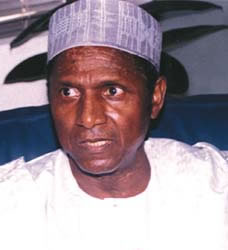


Posted by From Martins Oloja, Madu Onuorah And Florence Oretade, Abuja on



PRESIDENT Umaru Musa Yar'Adua has directed the Economic and Financial Crimes Commission (EFCC) to arrest a serving Minister for allegedly flouting a presidential directive on returning unspent funds in the last days of 2007 to the public treasury and for partaking in sharing in the proceeds of contracts awarded illegally.
PRESIDENT Umaru Musa Yar'Adua has directed the Economic and Financial Crimes Commission (EFCC) to arrest a serving Minister for allegedly flouting a presidential directive on returning unspent funds in the last days of 2007 to the public treasury and for partaking in sharing in the proceeds of contracts awarded illegally.
Sources also told The Guardian that the female Minister might be among those to be shown the way out in the "looming sweeping changes in several areas of the Executive, including top officials of the administration."
The sources also added that the President, buoyed by recent court reprieve, has made it known to some of his aides that many of the Ministers, who emerged through unavoidable political process, "do not have the requisite capacity for their assignments."
The Minister, currently facing interrogation by the EFCC, is accused of awarding contracts without following due process in the last few days of 2007 and sharing in the proceeds of the contracts.
The President gave the directive for the arrest last Monday, a day before he left Nigeria for his four-day visit to China.
Last December, President Yar'Adua had directed that all unspent money by Ministries, Departments and Agencies be returned to the treasury. This was after he had given an earlier directive that no contract should be awarded in the last month of the year. The directives had not gone down well with some of the Ministers.
The Guardian investigations reveal that in February, the President ordered preliminary investigations to ascertain compliance with the directives, following reports that some Ministers found a way to keep part of the money.
In public service escape route, officers call the device "ware-housing the fund" to be spent later. That explains the spate of travels and frivolous workshops that have marked the beginning of the year in Abuja even when budgets had not been approved.
It is the 'ware-housed' appropriated money that some smart Ministries, Departments and agencies (MDAs) spend unchecked.
As a public servant explained at the weekend, "even the judicial arm of government is involved in this ancient practice of beating government directive at the end of the year..."
Though the final report of the presidential directive has not been turned in, preliminary investigations show that in one Ministry, contracts worth about N300 million were actually awarded without due process in the last few days of the year. Besides, most of the money was shared, with the Minister in charge taking a cut.
The preliminary investigations also show that the Minister of State in the Ministry, an architect, declined his portion of the contract proceeds, which was labeled, "Christmas welfare."
Since only the Federal Executive Council can award contracts above N50 million, the said contracts were allegedly broken into smaller pieces of slightly above N40 million each and the contract dates backdated.
Investigations also reveal that there was disagreement in the sharing of the loot from the contract. So, some officers, who were reportedly not favoured in the sharing of the loot, alerted the EFCC.
It was learnt that early this year, an Abuja-based newsmagazine was rocked by an attempt to "investigate" an alleged scandal in the ministry at issue.
The phantom investigation resulted in the suspension of two of the magazine's top editors, who allegedly collected some money to kill a story linked to the minister being investigated.
But the highpoint of the "investigation" was that the magazine's editor, who sanctioned the two editors for failure to brief him on the deal in the ministry, was himself enmeshed in the bargain and collected about N3.5 million to kill the story.
However, the current whistle blowers did not contact the magazine this time, as they earlier did. Instead, they wrote to the EFCC.
Subsequently, trouble began last week when the EFCC moved into the prime ministry and invited two directors and some of the special assistants to the minister, whom the petitioners said were accessories after the fact of the graft, for questioning.
According to one of the sources, it was when the President heard this last Monday that he directed the EFCC to arrest the Minister, who is currently facing interrogation.
Spokesman for the EFCC, Mr. Osita Nwaja, declined to speak on the issue, telling The Guardian on phone, "I don't have anything on it (arrest or interrogation of the Minister) yet."
The President, the source added, has also asked the Acting Chairman of the EFCC, Mr. Ibrahim Lamorde, to be free to carry out interrogation or arrest of any suspect without seeking his clearance first.
Said the source: "(President) Yar'Adua has told Mr. Lamorde that he doesn't have to be contacted any time the EFCC sees the need to invite any government officials, whether Minister or head of agencies, on issues bordering on allegation of corruption."
The source noted that the President is pleased with the work of the EFCC chairman since his assumption of office especially as "he is working assiduously behind the scene. This is because he does not practice trial by the media. He doesn't reveal too much to the media. He has been working quietly but effectively. This President sure likes his method."
Special Adviser to the President (Communications), Mr. Olusegun Adeniyi, in an SMS response to The Guardian inquiry on telephone, noted: "I am aware there are some issues concerning a Minister and the President is on top of the situation. His disposition is that the law will have to take its course."
Adeniyi, however, pleaded to be given time to speak with Lamorde (acting EFCC Chairman) first and "I promise you the details when we return (from China)."

